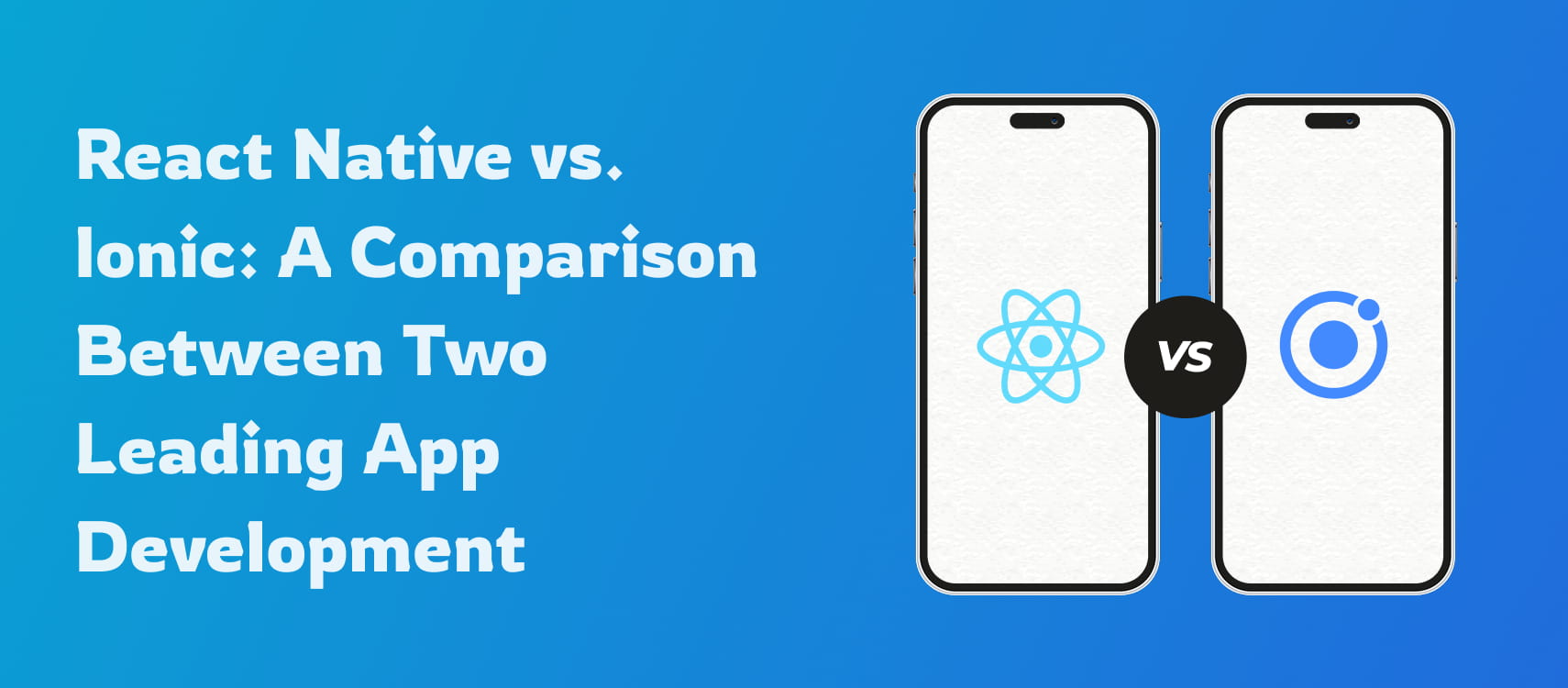Table of Contents
- React Native
- Key Features of React Native
- Benefits of React Native
- Use Cases
- Ionic
- Key Features of Ionic
- Benefits of Ionic
- React Native vs. Ionic
- Summarising
Choosing the right framework for mobile app development is a critical decision that can significantly impact the success of your project. Two popular contenders in the cross-platform development landscape are React Native and Ionic. Whether you should opt for React Native app development or go for Ionic, this requires a lot of considerations..
In this in-depth article, we will try to dig deeper into the features, performance, ecosystem, and use cases of these two frameworks. By reading this article it will be easier to make the right choice between React Native or Ionic app development for your project.
React Native: Empowering Native-Like Performance
React Native is a powerful JavaScript framework for building cross-platform mobile applications with native user experience. React Native app development services are hired to create mobile apps that look and feel like native apps, all while leveraging their JavaScript skills. Let’s explore its key features, benefits, and use cases.
Key Features of React Native
-
Native Components:
React Native offers a rich set of pre-built native components that enable seamless integration with device-specific functionality and provide a native user experience.
-
Hot Reloading:
Developers can instantly see the results of code changes with hot reloading, significantly speeding up the development process.
-
Community and Ecosystem:
React Native has a vast and active community, resulting in a wealth of third-party libraries, plugins, and resources.
-
Performance:
Apps built with React Native perform exceptionally well due to the use of native modules and a bridge that connects JavaScript code with native code.
Key Benefits of Hiring React Native App Developers
-
Code Reusability:
With a shared codebase for iOS and Android, developers can reuse a significant portion of their code, saving time and effort.
-
Near-Native Performance:
React Native offers near-native performance, ensuring a smooth and responsive user experience.
-
Rapid Development:
The framework’s component-based architecture and third-party libraries enable rapid development.
-
Strong Developer Community:
A vast community of developers contributes to the framework’s continuous improvement and offers extensive support.
Top Use Cases for React Native Development
-
Social Media Apps:
React Native has been used to develop social media giants like Facebook, Instagram, and Pinterest.
-
E-commerce Apps:
Many popular e-commerce apps, such as Walmart and Shopify, have harnessed the power of React Native.
-
Business and Productivity Apps:
React Native is suitable for building business and productivity apps that demand robust performance and a native-like experience.
Ionic: A Versatile Hybrid Framework
Ionic is an open-source framework for building hybrid mobile applications using web technologies such as HTML, CSS, and JavaScript. Ionic development emphasizes ease of use and simplicity. Now, let’s go deeper into Ionic’s features, benefits, and use cases.
Read More: Flutter vs React Native vs Xamarin vs Ionic
Key Features of Ionic App Development
-
UI Components:
Ionic provides a library of UI components that are designed to look and feel like native components on various platforms.
-
Cordova Plugins:
It seamlessly integrates with Apache Cordova plugins, allowing access to device features like the camera, GPS, and file system.
-
Single Codebase:
Ionic enables the creation of apps for multiple platforms (iOS, Android, web, and more) from a single codebase.
-
Progressive Web App (PWA) Support:
Ionic applications can be transformed into progressive web apps, enhancing their accessibility and reach.
Key Benefits of Ionic App Development
-
Rapid Development:
Ionic’s use of web technologies simplifies and accelerates development.
-
Cross-Platform Compatibility:
With a single codebase, developers can target multiple platforms, reducing development time and cost.
-
Large Library of Plugins:
Ionic’s integration with Cordova plugins extends its functionality and access to device features.
-
Community Support:
An active community contributes to the framework’s growth and provides resources for troubleshooting and learning.
React Native vs. Ionic: Key Differences
Performance
-
React Native:
Offers near-native performance by utilizing native modules and optimizing the bridge between JavaScript and native code.
-
Ionic:
Performs well for simple apps but may lag behind React Native for more complex and resource-intensive applications.
Development Speed
-
React Native:
The component-based structure and hot reloading feature contribute to a fast development process.
-
Ionic:
Its simplicity and use of web technologies make for quick development, especially for basic apps.
Native Feel
-
React Native:
Provides a truly native feel with access to native modules and a focus on native-like user interfaces.
-
Ionic:
Offers a native-like experience but may not match the depth of native integration achieved by React Native.
Code Reusability
-
React Native:
Allows for a high degree of code reusability, sharing a substantial portion of code between iOS and Android.
-
Ionic:
Also supports code reusability but may require adjustments for platform-specific features.
Learning Curve
-
React Native:
Requires familiarity with JavaScript and React concepts, making it more accessible to developers with web development experience.
-
Ionic:
Ideal for web developers already well-versed in HTML, CSS, and JavaScript.
Community and Ecosystem
-
React Native:
Boasts a larger community and extensive third-party libraries and plugins.
-
Ionic:
Has a strong community but may not match the size and diversity of React Native’s ecosystem.
Summarising
In the React Native vs. Ionic battle, the choice depends on your project’s specific requirements and your team’s expertise. React Native shines when you need a high-performance app with a truly native feel, making it suitable for complex applications and large user bases. On the other hand, Ionic offers rapid development for simpler apps and excels in scenarios where cross-platform compatibility is a priority.










